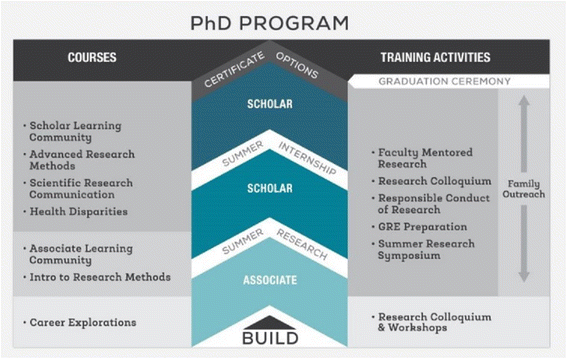Advancing research opportunities and promoting pathways in graduate education: a systemic approach to BUILD training at California State University, Long Beach (CSULB)
- PMID: 29375667
- PMCID: PMC5773868
- DOI: 10.1186/s12919-017-0088-3
Advancing research opportunities and promoting pathways in graduate education: a systemic approach to BUILD training at California State University, Long Beach (CSULB)
Abstract
Background and purpose: First-generation college graduates, racial and ethnic minorities, people with disabilities, and those from disadvantaged backgrounds are gravely underrepresented in the health research workforce representing behavioral health sciences and biomedical sciences and engineering (BHS/BSE). Furthermore, relative to their peers, very few students from these underrepresented groups (URGs) earn scientific bachelor's degrees with even fewer earning doctorate degrees. Therefore, programs that engage and retain URGs in health-related research careers early on in their career path are imperative to promote the diversity of well-trained research scientists who have the ability to address the nation's complex health challenges in an interdisciplinary way. The purpose of this paper is to describe the challenges, lessons learned, and sustainability of implementing a large-scale, multidisciplinary research infrastructure at California State University, Long Beach (CSULB) - a minority-serving institution - through federal funding received by the National Institutes of Health (NIH) Building Infrastructure Leading to Diversity (BUILD) Initiative.
Program and key highlights: The CSULB BUILD initiative consists of developing a research infrastructure designed to engage and retain URGs on the research career path by providing them with the research training and skills needed to make them highly competitive for doctoral programs and entry into the research workforce. This initiative unites many research disciplines using basic, applied, and translational approaches to offer insights and develop technologies addressing prominent community and national health issues from a multidisciplinary perspective. Additionally, this initiative brings together local (e.g., high school, community college, doctoral research institutions) and national (e.g., National Research Mentoring Network) collaborative partners to alter how we identify, develop, and implement resources to enhance student and faculty research. Finally, this initiative establishes a student research training program that engages URGs earlier in their academic development, is larger and multidisciplinary in scope, and is responsive to the life contexts and promotes the cultural capital that URGs bring to their career path.
Implications: Although there have been many challenges to planning for and developing CSULB BUILD's large-scale, multidisciplinary research infrastructure, there have been many lessons learned in the process that could aid other campuses in the development and sustainability of similar research programs.
Conflict of interest statement
Guido G. Urizar Jr. (BUILD Principal Investigator), Chi-Ah Chun (BUILD program director, Student Training Core), Kim Vu (BUILD program director, Institutional Development Core), and Gino Galvez (CSULB BUILD evaluation consultant) are in the Department of Psychology at California State University, Long Beach (CSULB). Laura Henriques (BUILD community college coordinator) is in the Department of Science Education at CSULB. Paul Buonora (BUILD program director, Research Enrichment Core) is in the Department of Chemistry and Biochemistry at CSULB. Laura Kingsford (BUILD Principal Investigator) is the Dean of the College of Natural Sciences & Mathematics at CSULB.The CSULB BUILD Initiative was conducted in full compliance with ethical standards and approved by the Institutional Review Board at California State University, Long Beach.Not applicableThere are no conflicts of interest in this manuscript with any of the authors in any way.Springer Nature remains neutral with regard to jurisdictional claims in published maps and institutional affiliations.
Figures
References
-
- National Science Board: Science and engineering indicators. Arlington, VA: National Science Foundation; 2012.
-
- Nelson DJ: Nelson Diversity Surveys, Diversity in Science Association: Norman, OK, 2004. Retrieved 11 May 2010 from http://chem.ou.edu/~djn/diversity/top50.html.
-
- Hurtado S, Chang JC, Sáenz VB, Espinosa LL, Cabrera NL, Cerna OS. Predicting transition and adjustment to college: minority biomedical and behavioral science students’ first year of college. Res High Educ. 2007;48(7):841–887. doi: 10.1007/s11162-007-9051-x. - DOI
-
- National Center for Education Statistics . Education statistics quarterly. Alexandria, VA: National Center for Education Statistics; 2001.
-
- Geis S: Long Beach awaits hate-crime verdict, Washington post website; 2007. Retrieved 11 May 2010 from http://www.washingtonpost.com/wp-dyn/content/article/2007/01/22/AR200701....
Grants and funding
LinkOut - more resources
Full Text Sources
Other Literature Sources
Molecular Biology Databases


